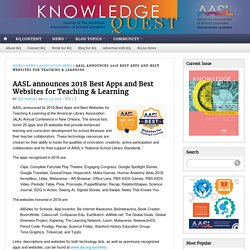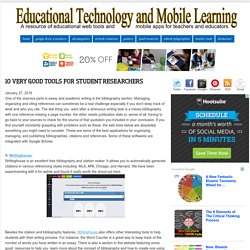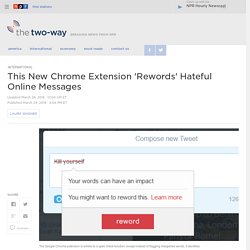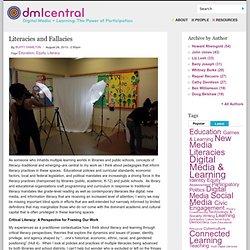

AASL announces 2018 Best Apps and Best Websites for Teaching & Learning. AASL announced its 2018 Best Apps and Best Websites for Teaching & Learning at the American Library Association (ALA) Annual Conference in New Orleans.

The annual lists honor 25 apps and 25 websites that provide enhanced learning and curriculum development for school librarians and their teacher collaborators. These technology resources are chosen for their ability to foster the qualities of innovation, creativity, active participation and collaboration and for their support of AASL’s “National School Library Standards.” The apps recognized in 2018 are: Kathy Schrock's Guide to Everything - Home Page. A Media Specialist's Guide to the Internet. W.I.S.E.R. in practice (high school) 10 Very Good Tools for Student Researchers. January 27, 2016 One of the onerous parts in essay and academic writing is the bibliography section.

Managing, organizing and citing references can sometimes be a real challenge especially if you don't keep track of what and who you cite. The last thing you want after a strenuous writing task is a messy bibliography with one reference missing a page number, the other needs publication date or, worse of all, having to go back to your sources to check for the source of that quotation you included in your conclusion. If you find yourself constantly grappling with problems such as these, the web tools below are absolutely something you might need to consider. These are some of the best applications for organizing, managing, and publishing bibliographies, citations and references.
Some of these softwares are integrated with Google Scholar. Writinghouse is an excellent free bibliography and citation maker. Citefast is an easy to use web tool for creating citations. 8- RefWorks 9- EasyBib. Chrome Extensions. Teacher Librarian Blogs. The Unquiet Librarian. ISS Learning Commons. Five-Minute Film Festival: Virtual Field Trips. The dog days of summer are upon us; now is the time when all the other activities have run out. Whether you're a parent looking to entertain bored, overheated children, or a teacher already brainstorming ways to break down the four walls of your classroom in the fall, how about taking a virtual field trip?
As edtech writer Audrey Watters argues, real-life field trips offer enriching experiences that virtual ones can't, but resources are not always available for in-person trips. Besides -- virtual trips can take you places that wouldn't be logistically possible in the real world. I've gathered a playlist of videos to inspire your own virtual adventures!
Video Playlist: Virtual Field Trips Watch the player below to see the whole playlist, or view it on YouTube. More Resources for Exploring Virtually. This New Chrome Extension 'Rewords' Hateful Online Messages. The Google Chrome extension is similar to a spell check function, except instead of flagging misspelled words, it identifies insults and hateful messages and then prompts the user to write something else.

Screen grab/NPR hide caption toggle caption Screen grab/NPR "Once an insult is read, the damage is done. " That's from the website for Reword, a new Google Chrome extension designed to combat cyberbullying. The tool identifies insulting words in online posts and messages, and then crosses them out with a red line. Developed in Australia by Headspace, which is Australia's National Youth Mental Health Foundation, and ad agency Leo Burnett Melbourne, Reword aims to address online abuse by preventing hateful messages before they're even posted. CC Search. PD Series: 10 Digital Tools For Your Library. Mrs Lodge's Library. Kids' Lit Quiz USA Home.
PLN. Creative Commons. The Unquiet Librarian. Literacies and Fallacies. As someone who inhabits multiple learning worlds in libraries and public schools, concepts of literacy–traditional and emerging–are central to my work as I think about pedagogies that inform literacy practices in these spaces.

Educational policies and curricular standards, economic factors, local and federal legislation, and political mandates are increasingly a driving force in the literacy practices championed by libraries (public, academic, K-12) and public schools. Critical Literacy: A Perspective for Framing Our Work My experiences as a practitioner contextualize how I think about literacy and learning through critical literacy perspectives, theories that explore the dynamics and issues of power, identity, privilege, and agency shaped by “…one’s historical, economic, ethnic, racial, and gendered positioning” (Hull 4).
Critical Literacy: Deborah Brandt’s “Sponsors of Literacy” Sponsors of Literacy as an Interpretive Lens for an Inquiry Stance Banner image credit: danxoneil. Librarian/Education Bloggers. How to Create a Word Cloud in Google Documents.